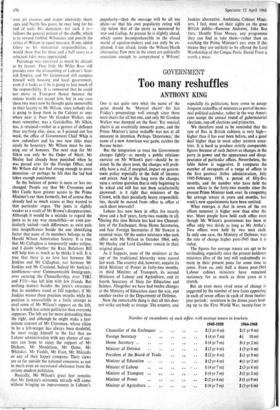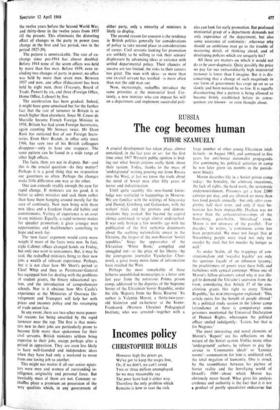Too many reshuffles
GOVERNMENT ANTHONY KING
One is not quite sure what the name of the game should be. `Musical chairs' fits last Friday's proceedings well enough since there were chairs for all but one, and only Mr Gordon Walker was dumped on the floor. Yet musical chairs is an essentially innocent game, and the Prime Minister's latest reshuffle was not at all innocent in intention. Perhaps `Deterrence,' the' name of a new American war game, catches the flavour better.
But the temptation to treat the Government changes lightly—as merely a public relations exercise on Mr Wilson's part—should be re- sisted. In the short term, the changes will prob- ably have a real, if marginal, impact on govern- ment policy especially in the field of incomes and prices. And in the long term the changes raise a serious question that is only beginning to be asked and still has not been satisfactorily answered: is it right that ministers of the Crown, with their peculiarly heavy responsibili- ties, should be moved from office to office at such short intervals?
Labour has now been in office for exactly three and a half years, forty-two months in all. `During this time Britain has had two Chancel- lors of the Exchequer, three Home Secretaries, and four Foreign Secretaries if Mr Stewart is counted twice. Of the senior ministers who took office with Mr Wilson in October 1964, only Mr Healey and Lord Gardiner remain in their original places.
As it happens, none of the ministers at the top of the traditional hierarchy were moved last week. The country did, however, acquire its third Minister of Power in forty-two months, its' third MiniSter of Transport, its second Ministers of Labour and Agriculture, and its fourth Secretary of State for Education and Science. Altogether we have had twelve changes at the Ministry of Education since the war, and another twelve at the Department of Defence. Now the remarkable thing is that all this does not strike anybody as strange. The country, and especially its politicians; have • come to accept frequent reshuffles of ministers• as part of the nor- mal political calendar, rather in the way Ameri- cans accept the annual round of gubernatorial elections, run-off elections and primaries.
We therefore need to be reminded that the rate of flux in British cabinets is very high— higher than it has ever been before, and a good deal higher than in most other western coun- tries. It is hard to produce strictly comparable figures because of such factors as changes in the party in power and the appearance and disap- pearance of particular offices. Nevertheless, the table below is suggestive. It compares the number of occupants of a range of offices in the first postwar Attlee administration, July 1945-February 1950, a period of fifty-five months, and the number who have held the same offices in the forty-two months since the present Prime Minister took over. In computing the average tenure in years and months, last week's new appointments have been omitted.
What emerges is that in seven of the ten offices turnover is higher now than after the war. More people have held each office even though Mr Wilson's government has been in office only two thirds as long as Mr Attlee's. Two offices were held by two men each. In only one case, the Ministry of Defence, was the rate of change higher post-1945 than it is today.
The figures for average tenure are apt to be misleading, especially since the present holdover ministers (five of the ten) will undoubtedly re- - main in their present posts for some time to come. Even so, only half a dozen post-1964 Labour cabinet ministers have remained stationary for as much as three years at a stretch.
But an even more vivid sense of change is suggested by the number of new faces appearing in each of seven offices in each of three twelve- year periods: seventeen in the dozen years lead- ing up to the First World War, twenty-four in Number of incumbents of each office, with average tenure in brackets.
1945-1950 1964-1968 Chancellor of the Exchequer • •
• •
• •
2 (2 yr 4 m) 2(1 yr 9 m) Foreign Secretary • •
• •
• •
1 (4 yr 7 m) 4( 10m) Home Secretary ..
• •
• di • •
1 (4 yr 7 m) 3(1 yr2m) • Minister of Defence • •
• •
• •
2 (2 yr 4 m) 1 (3 yr 6 m) President of the Board of Trade
• •
.•
2 (2 yr 4 m) yr9m) Minister of Education . • • • • •
:• •
2 (2 yr 4 m) -4(1 yr 2m) Minister of Labour • • • . • •
:• •
4 •
•
1 (4 yr 7 m) 2 (3 yr 6 m) Minister of Transport • • i• • • •
• • •
1 (4 Yr 7 m) 311 yr 2 m) Minister of Power • . • . • •
• • ' • •
2 (2 yr 4 m) 3(1 yr 9 m) Minister of Agriculture .. • • • •
• •
1 (4 yr 7 m) 2(3 yr 6m)
the twelve years before the Second World War, and thirty-three in the twelve years from 1957 till the present. This eliminates the distorting effect of changes in the party in power (one change in the first and last period, two in the period 1927-39).
The pattern is unmistakable. The rate of ex- change since pre-1914 has almost doubled. Before 1914 none of the seven offices was held by more than five men. Before 1939, even in- cluding two changes of party in power, no office was held by more than seven men. Between 1957 and now, one office (Education) has been held by eight men, three (Treasury, Board of Trade, Power) by six, and three (Foreign Office, Home Office, Labour) by five.
The acceleration has been gradual. Indeed, it might have gone unnoticed but for the further fact that the rate of turnover in Britain is so much higher than elsewhere. Since M. Couve de Murville became French Foreign Minister in 1958, Britain has had seven Foreign Secretaries, again counting Mr Stewart twice. Mr Dean Rusk has outlasted five of our Foreign Secre- taries. Even Herr Brandt, in office only since 1966, has seen. two of his British colleagues disappear—only to have one reappear. The same pattern can be found in a wide range of other high offices.
The facts, then, are not in dispute. But—and this is the crucial question—do they matter? Perhaps it is a good thing that we re-position our governors so often. Perhaps the changes make little difference one way or the other.
One can concede readily enough the case for rapid change. If ministers are no good, it is better to admit mistakes and sack them rather than have them hanging around merely for the sake. of continuity. New men bring with them new ideas and a freedom from old habits and commitments. Variety of experience is an asset in any minister. Equally, a rapid turnover makes for speedier promotion; it gives younger men opportunities and backbenchers something to hope and work for.
The 'new faces' argument would carry more weight if more of the faces were new. In fact, eight Cabinet offices changed hands on Friday, but only two went to newcomers. But, it may be said, the reshuffled ministers bring to their new jobs a wealth of relevant experience. Perhaps, but it is not. clear how Mr Short's period as Chief Whip and then as Postmaster-General has equipped him for dealing with the problems of student grants, the binary educational sys- tem, and the introduction of comprehensive schools. Nor is it obvious how Mrs Castle's experience at the Ministries of Overseas De- velopment and Transport will help her with prices and incomes policy and the revamping of trade union law.
In any event, there are two other more power- ful reasons for being unsettled by the rapid turnover near the top. The first is that minis- ters new to their jobs are particularly prone to become little more than spokesmen for their civil servants. British ministers seldom bring expertise to their jobs, except perhaps after a period in opposition. They are even less likely to have well-founded and independent ideas when they have had only a weekend to move from one taxing job to another.
This might not matter if all our senior minis- ters were men and women of outstanding in- telligence, originality and, personal force. But inevitably most of them are not. Constant re- shuffles place a premium on possession of the very qualities which, in any government of either party, only a minority of ministers is likely to' display.
The second reason for concern is the tendency in British politics generally for considerations of policy to take second place to considerations of career. Civil servants looking for promotion are unlikely to be willing to risk their seniors' displeasure by advancing ideas at variance with settled departmental policy. Their chances of success are too limited, the risks to their careers too great. The man with ideas—as more than one ex-civil servant has testified—is more often than not the odd man out.
Now, increasingly, reshuffles introduce the same priorities at the ministerial level. Cer- tainly, a new minister who can impose his will on a department and implement successful poli-
cks can look for early promotion. But profound ministerial grasp of a department demands not only experience of the department, but also some assurance of continuity : otherwise why should an ambitious man go to the trouble of mastering detail, of thinking ahead, and of developing policies which are uniquely his? •
All these are matters on which it would not do to be over-dogmatic. quite possibly the price we pay for our extraordinarily high ministerial turnover is lower than I imagine. But it is dis- concerting that a change of such magnitude in our form of government has crept up on us so slowly and been noticed by so few. It is equally disconcerting that a pattern is being allowed to become firmly established before its conse- quences are known—or even thought about.











































 Previous page
Previous page